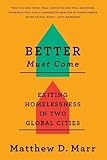Better Must Come : Exiting Homelessness in Two Global Cities / Matthew D. Marr.
Material type: TextPublisher: Ithaca, NY : Cornell University Press, [2015]Copyright date: ©2015Description: 1 online resource (240 p.) : 10 halftones, 4 maps, 1 tableContent type:
TextPublisher: Ithaca, NY : Cornell University Press, [2015]Copyright date: ©2015Description: 1 online resource (240 p.) : 10 halftones, 4 maps, 1 tableContent type: - 9780801455544
- Homeless persons -- Services for -- California -- Los Angeles
- Homeless persons -- Services for -- Japan -- Tokyo
- Homelessness -- California -- Los Angeles
- Homelessness -- Japan -- Tokyo
- Shelters for the homeless -- California -- Los Angeles
- Shelters for the homeless -- Japan -- Tokyo
- Anthropology
- Labor History
- Sociology & Social Science
- SOCIAL SCIENCE / Poverty & Homelessness
- Houselessness, Housing crisis, Housing market, housing lottery, international housis crisis, subsidized, vulnerable citizens
- 362.5920952135 23
- HV4506.L67 M37 2016
- online - DeGruyter
| Item type | Current library | Call number | URL | Status | Notes | Barcode | |
|---|---|---|---|---|---|---|---|
 eBook
eBook
|
Biblioteca "Angelicum" Pont. Univ. S.Tommaso d'Aquino Nuvola online | online - DeGruyter (Browse shelf(Opens below)) | Online access | Not for loan (Accesso limitato) | Accesso per gli utenti autorizzati / Access for authorized users | (dgr)9780801455544 |
Frontmatter -- Contents -- Preface and Acknowledgments -- 1. Encounter with the Philippines -- 2. Origins of the Bataan Boys -- 3. From the Approach of War to the Evacuation from Manila, October to December 1941 -- 4. The Fall of Manila and the First Offensive and Defensive Battles, Early January to Early February 1942 -- 5. Planning the Escape from Corregidor, Early February to Late February 1942 -- 6. The Evacuation of MacArthur from Corregidor, Late February to the Middle of March 1942 -- 7. The Second Bataan Operation and the Death March, Early February to Early May 1942 -- 8. From Australia to the Philippines, March 1942 to October 1944 -- 9. From the Philippines to Japan, October 1944 to August 1945 -- 10. The Demilitarization of Japan, August 1945 to December 1947 -- 11. The Democratization of Japan, August 1945 to April 1950 -- 12. Washington’s Policy Shift on Japan and MacArthur’s Resistance, January 1948 to June 1950 -- 13. The Korean War and the Dismissal of MacArthur, June 1950 to April 1951 -- Conclusion -- Notes -- Bibliography -- Index
restricted access online access with authorization star
http://purl.org/coar/access_right/c_16ec
In Better Must Come, Matthew D. Marr reveals how social contexts at various levels combine and interact to shape the experiences of transitional housing program users in two of the most prosperous cities of the global economy, Los Angeles and Tokyo. Marr, who has conducted fieldwork in U.S. and Japanese cities for over two decades, followed the experiences of thirty-four people as they made use of transitional housing services and after they left such programs. This comparative ethnography is groundbreaking in two ways—it is the first book to directly focus on exits from homelessness in American or Japanese cities, and it is the first targeted comparison of homelessness in two global cities.Marr argues that homelessness should be understood primarily as a socially generated, traumatic, and stigmatizing predicament, rather than as a stable condition, identity, or culture. He pushes for movement away from the study of "homeless people" and "homeless culture" toward an understanding of homelessness as a condition that can be transcended at individual and societal levels. Better Must Come prescribes policy changes to end homelessness that include expanding subsidized housing to persons without disabilities and experiencing homelessness chronically, as well as taking broader measures to address vulnerabilities produced by labor markets, housing markets, and the rapid deterioration of social safety nets that often results from neoliberal globalization.
Mode of access: Internet via World Wide Web.
In English.
Description based on online resource; title from PDF title page (publisher's Web site, viewed 26. Apr 2024)


